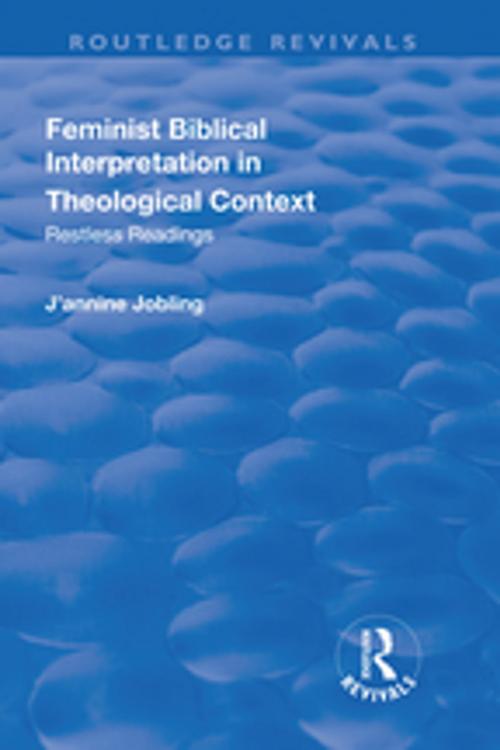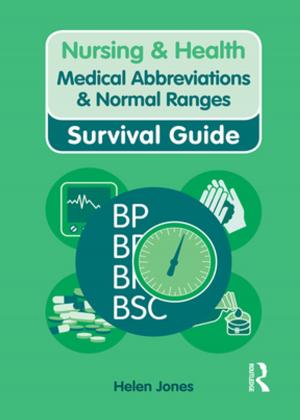Feminist Biblical Interpretation in Theological Context: Restless Readings
Restless Readings
Nonfiction, Social & Cultural Studies, Social Science| Author: | J'annine Jobling | ISBN: | 9781351740388 |
| Publisher: | Taylor and Francis | Publication: | February 5, 2018 |
| Imprint: | Routledge | Language: | English |
| Author: | J'annine Jobling |
| ISBN: | 9781351740388 |
| Publisher: | Taylor and Francis |
| Publication: | February 5, 2018 |
| Imprint: | Routledge |
| Language: | English |
This title was first published in 2002: The premise of the text is that there is a continuing need for biblical hermeneutic propsals and frameworks which emerge from the fields of both feminism and Christian theology. Feminism, the author asserts, demands not only the plotting of new routes but the restructuring of entire landscapes. As such this project, since it seeks to develop a feminist theological frame for meaning, impinges on and is impacted by innumerable inter-relating questions. In consequence, the scope of the book is necessarily both broad and interdisiplinary. The author, J'annine Jobling, uses particular texts and has articulated her own positions in response. In this way the embodied practice of thinking-in-relation is mirrored in the texts produced. This has determined the macro-structure of the thesis, which is based on an analysis of two feminist biblical scholars: Elisabeth Schussler Fionenza and Phyllis Trible. From this analysis Jobling identifies two primary principles for interpretation: rememberance and destabilization. This is a strategy which allows both materialist and post-structuralist perspectives to be set into play, each of which has vital contributions to make to feminist enterprises. The "Bible" is understood as matrix, as a set of discourses which are permeable to and intersect with other cultural discourses. The task of feminist interpretation is then to reconstitute the heterogenous biblical matrix in feminist horizons. A fundamental tenet of the book is that hermeneutics inhabits particular metaphysical constructs. Therefore, the argument extends from an interpretation of the Bible to an epistemological framework in which an eschatological hereneutic is recommended, to a metaphysical framework which takes eschatology as its structuring principle. The author argues that it is eschatology which can provide the resources for an ontological model radically disruptive of a metaphysics of presence, and in which it is possible to discern the traces of God. From this outermost limit of the author's hermeneutic investigations, the text returns to the centre: the feminist discursive community and develops a construct that the ekklesia, as a feminist deliberative space set oppositionally to structures, worldviews and idealogies operates on patriarchal logics. The relationship of this "imagined community" is compared to the Christian Church and scripture, ethics and gendered identity within a logic of equity.
This title was first published in 2002: The premise of the text is that there is a continuing need for biblical hermeneutic propsals and frameworks which emerge from the fields of both feminism and Christian theology. Feminism, the author asserts, demands not only the plotting of new routes but the restructuring of entire landscapes. As such this project, since it seeks to develop a feminist theological frame for meaning, impinges on and is impacted by innumerable inter-relating questions. In consequence, the scope of the book is necessarily both broad and interdisiplinary. The author, J'annine Jobling, uses particular texts and has articulated her own positions in response. In this way the embodied practice of thinking-in-relation is mirrored in the texts produced. This has determined the macro-structure of the thesis, which is based on an analysis of two feminist biblical scholars: Elisabeth Schussler Fionenza and Phyllis Trible. From this analysis Jobling identifies two primary principles for interpretation: rememberance and destabilization. This is a strategy which allows both materialist and post-structuralist perspectives to be set into play, each of which has vital contributions to make to feminist enterprises. The "Bible" is understood as matrix, as a set of discourses which are permeable to and intersect with other cultural discourses. The task of feminist interpretation is then to reconstitute the heterogenous biblical matrix in feminist horizons. A fundamental tenet of the book is that hermeneutics inhabits particular metaphysical constructs. Therefore, the argument extends from an interpretation of the Bible to an epistemological framework in which an eschatological hereneutic is recommended, to a metaphysical framework which takes eschatology as its structuring principle. The author argues that it is eschatology which can provide the resources for an ontological model radically disruptive of a metaphysics of presence, and in which it is possible to discern the traces of God. From this outermost limit of the author's hermeneutic investigations, the text returns to the centre: the feminist discursive community and develops a construct that the ekklesia, as a feminist deliberative space set oppositionally to structures, worldviews and idealogies operates on patriarchal logics. The relationship of this "imagined community" is compared to the Christian Church and scripture, ethics and gendered identity within a logic of equity.















